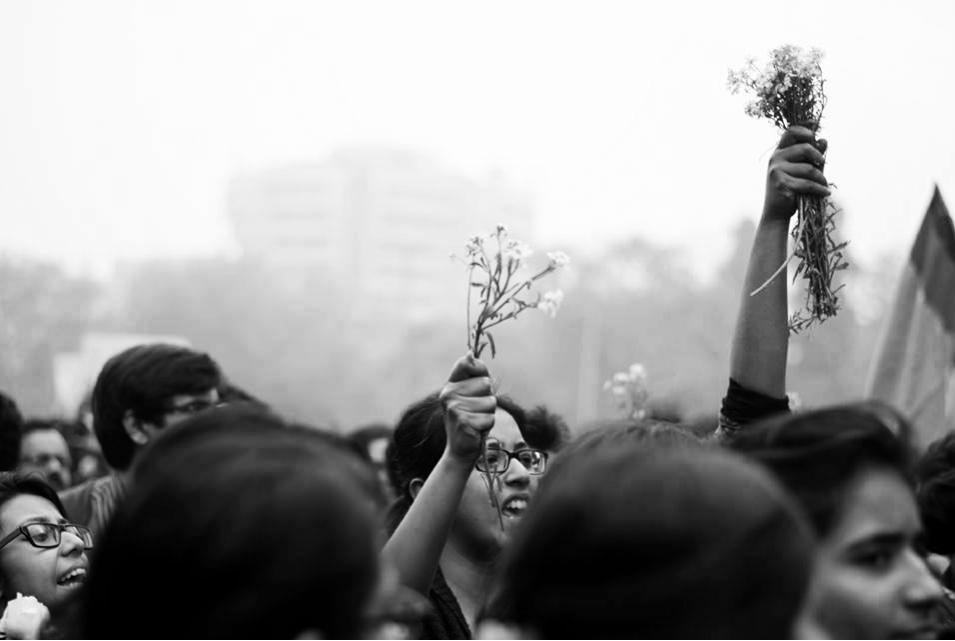Celebrating McCarthyism? A Rejoinder To Tavleen Singh

OXFORD: This article is a response to the column written by Tavleen Singh in the Indian Express on 21 February 2016 entitled ‘Celebrating India’s destruction’. I was provoked into writing a reply as I not only found Singh’s reasoning poor but disturbingly prejudiced and paranoid. The attempt here is not to attack the person, but engage with her argument and break it down.
Tavleen Singh begins her piece by condemning slogans like 'India you will be broken into pieces' allegedly shouted at JNU on 9 February. One certainly has the right to disagree with and condemn such slogans. However, in a slippery-slope argument, she goes on to pronounce that these slogans were 'the most important threat to national security'. In doing so, she disregards the Supreme Court judgement that has upheld that casual sloganeering does not amount to sedition.
Singh then sweepingly equates all support for JNU as support for the above-mentioned anti-India slogans. This conveniently overlooks the fact that most JNU students, teachers, and their supporters have expressed their discomfort with and condemned the alleged slogans that speak of breaking India up. However, at the same time, they disagree with Kanhaiya Kumar’s arbitrary arrest, and believe there is nothing wrong with holding an event that discusses the hanging of Afzal Guru and the Azadi movement in Kashmir. Moreover, they oppose the branding of JNU and its supporters as 'anti-national'. Tavleen Singh conflates these separate issues, elides all nuance, such that protesting the branding of JNU as ‘anti-national’ becomes equivalent to supporting anti-India slogans.
Her article goes on to speak of anti-India sentiments found in Pakistan. She then recounts slogans that she allegedly heard in Pakistan in the late 1980s (‘Bhutto hum sharminda hain, tere kaatil zinda hain’) and 2007 (‘Har ghar se Bhutto niklega, tum kitne Bhutto maaroge’). These slogans are from decades ago, were articulated in the context of Pakistan’s own domestic politics, and have absolutely nothing to do with anti-India sentiments she spoke of before. But Singh reads something sinister in the formal similarity between them and the slogans heard at JNU on February 9. She insinuates that this ‘cross-border sloganeering’ - as she calls it – is evidence of collusion with those in Pakistan who ‘would like to see India destroyed’. One would expect an accusation as serious as treason, sedition and conspiracy to be backed by ‘evidence’ more substantial than mere similarity of linguistic form in slogans. If one had to draw conclusions based on similarity in slogans, are we to conclude that the BJP is also in cahoots with Pakistan? Indeed, it too had once shouted a slogan that shares the linguistic form of the Bhutto-related slogans heard in Pakistan ("Desh abhi sharminda hai, Afzal abhibhi zinda hai").
What grand design must we read into this ‘cross-border sloganeering’? Such poor logic and argumentation leaves one with no choice but to agree with Tavleen Singh when she claims she is a 'natural conspiracy theorist'. The bogey of Pakistan raised by her serves to stoke fears of a fifth column.
Having made this flimsy link between slogans in JNU and anti-India sentiments in Pakistan, she allows herself to sweepingly paint everyone who supports JNU as people who are sympathetic to anti-India sentiments in Pakistan. This is not only poor argumentation, it is irresponsible journalism.
Singh then undertakes another summary media trial and condemns Umar Khalid to be guilty of spreading a 'jihadist agitation' across universities in India. In doing so, she overlooks the fact that there is no evidence so far that Khalid shouted any of the slogans, nor that he had any links with any 'jihadi' organisation. What he did say was that he supports Kashmir's right to self-determination. Khalid has a right to voice his opinion, and dissent - from Tavleen Singh and the Indian government. This is a right given to him under the Indian constitution, something that Singh unfortunately either lacks knowledge of or respect for.
The column ends by justifying the behaviour of Hindu extremist violence and hooliganism by painting them as victims of the propaganda of 'leftist historians' who apparently paint everything Hindu as bad and Hinduism as an inferior religion. This sweeping, baseless claim makes one wonder whether Tavleen Singh has read histories of Hinduism written by ‘left-wing’ historians, or indeed whether she is familiar with the research and methods of any historian. Unfortunately, her support for the present political dispensation and contempt for the left, seems to have skewed judgment to the extent that she not only rationalizes the hooliganism of Hindu extremists or hyper-nationalists – or the ‘Hindu rage’ as she calls it – but also participates in the the virulently illiberal anti-intellectualism that they subscribe to.
Tavleen Singh’s article is a good example of the disturbing tendency - rapidly gaining currency in Indian society - to make accusations of treason, sedition and ‘anti-nationalism’ against those who differ from oneself, with absolutely no regard for evidence, the law, or the Indian constitution. Such a tendency is not only confined to trolls or the ‘fringe’ as some would have us believe but can be found among individuals in positions of power and responsibility - politicians, lawyers and also media-persons.
The use of such language by people in positions of responsibility is not only legitimising and emboldening McCarthyist tendencies already prevalent in Indian society and politics. More disturbingly, it is now making it a legitimate language for ordinary people. Since this has the potential to polarise Indian society and wreck its fabric, to counter it is the gravest challenge before all responsible, law-abiding citizens today. This requires patiently engaging with and debunking the specious arguments of its proponents and, while doing so, encouraging critical thinking, knowledge of the law and the Indian constitution among ordinary people. This is a herculean task, and it must start now.
(Vanya Vaidehi Bhargav is a DPhil Candidate in the Department of History, University of Oxford).



